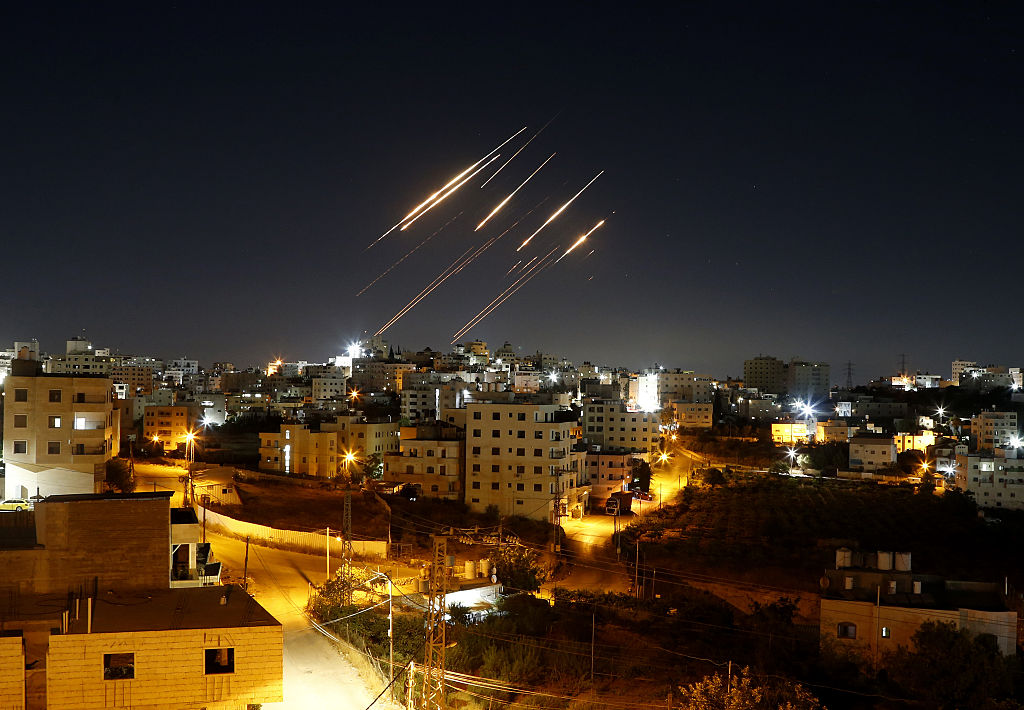Swift condemnations have poured in from the Muslim world castigating Israel for bombing Iran. The UAE condemned Israel ‘in the strongest terms’, Jordan spoke up against Israeli attacks ‘threatening regional stability’, Saudi Arabia denounced ‘blatant Israeli aggressions’, Turkey espoused ‘an end to Israel’s banditry’, while various Muslim diplomatic groups, including the Organisation of Islamic Cooperation (OIC), demanded ‘international action’ against the Jewish State. But cloaked underneath this predictably farcical rhetoric of ‘Muslim unity’ are the evolving interests of many of these states, which today align seamlessly with Israel.
Saudi Arabia has described ‘evil’ Iran as the ‘head of the snake’
In Israel’s immediate neighbourhood, Lebanese officials are blocking the depleted Iranian jihadist proxy Hezbollah from taking action against Israel. Meanwhile, the Ahmed al-Sharaa-led Syria, after toppling the pro-Iran Bashar al-Assad regime, has been negotiating a peace deal to recognise Israel and allow Syrian territory to be used to block Iranian attacks. Jordan, meanwhile, is directly intercepting Iranian missiles. This is similar to its downing of drones last year, as part of a regional military coalition featuring Saudi Arabia and the UAE that provided key intelligence against Iran. Turkey, too, reportedly had prior knowledge of Israeli strikes on Iran.
Sunni Gulf states have seen Shia Iran as an imperial threat in the region since clerics took over Tehran following the Iranian revolution in 1979. They accuse Iran of backing Shia uprisings against Sunni rulers in countries like Bahrain, along with pushing militia in Iraq and Yemen to aspire to propel Shia regimes. Of course, these Sunni states, led by Saudi Arabia, have long used jihadist proxies to exploit the same Sunni–Shia fault-lines and thwart Iranian plans in order to maintain their own regional hegemony. Riyadh went a step further by formulating a military alliance of Sunni states, the Islamic Military Counter Terrorism Coalition, aimed at Iran and its Shia allies. But while the Sunni–Shia sectarian divide within Islam is 14 centuries old, in recent years the antagonism has crossed the weapons-grade threshold following the advent of a very modern threat: the nuclear bomb.
When Israel struck Iranian nuclear sites and eliminated scientists along with key generals, it also inadvertently did so on behalf of leading Sunni regimes that have long been petrified by the prospect of Iran building a nuclear weapon.
Saudi Arabia, which has described ‘evil’ Iran as the ‘head of the snake’, has repeatedly condemned the US nuclear deal with Iran in 2015. It has also regularly urged other Muslim-majority countries to reject ‘Iranian terrorism’. Only a couple of weeks ago, Saudi defence minister Prince Khalid bin Salman warned Iranian officials to accept US president Donald Trump’s offer of a new nuclear agreement or face the Israeli strikes that followed a little over a fortnight later. A similar message was delivered by the UAE to Iran in March.
The Gulf states normalising relations with Israel are doing so as part of their modernising bids. This entails shunning violent Islamic laws and codes, from which their erstwhile antisemitic rhetoric against the Jewish State originates. This move is critical in order to diversify their petro-economies, which require regional stability to attract global investment. While sanctions-hit Iran has even more to gain financially by embracing moderation and peace in the region, it does not have a monarchy that could simply flip the switch on decades of spreading radical Islam and jihadist militancy. Self-identifying as ‘resistance’ against the West and Israel and flying the ‘flag of Islam against infidels’ is a matter of survival for the clerics in Tehran, even as the writing is on the wall for Iran’s rulers following the fall of their proxies in Syria and Lebanon.
If the Iranian regime is to go, it should ideally be toppled by the Iranians, who have lived under its brutalities for almost half a century, with local protests and attacks against the clergy increasing in recent years. While there are fears among the Iranian populace that the war could cause destruction similar to that seen in Gaza, there are millions of Muslims across the region who have suffered at the hands of Iran and its militias, and who would celebrate the demise of Iranian clerical rule – even if it is Israel that is to deal the final blow. And the Gulf states, led by Saudi Arabia, have already laid the groundwork to pose as the saviours and custodians of these Muslims in the aftermath of Israeli strikes they are officially condemning.
Saudi Arabia has conveniently distanced itself from what is, in effect, the execution of its plans against Iran by officially normalising relations with Tehran following a China-brokered deal in 2023, after seven years of severed ties. This has allowed Riyadh to publicly pose as a mediator in Iran’s nuclear talks with the US, while it covertly delivers Israeli threats to Tehran and continues to inform Washington of its intention to acquire nuclear arms.
Like Saudi Arabia, the UAE, Qatar and Turkey have their own plans to lead the Muslim world once the only non-Sunni claimant for the same – Iran – is effectively sidelined. All of these states, however, need Israel to eliminate the Iranian regime so as not to completely alienate Shia populations. Public hostility towards Israel will continue to grow in these countries as they quietly celebrate the gains of the Jewish state.






Comments